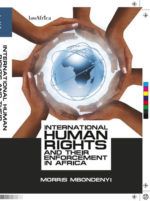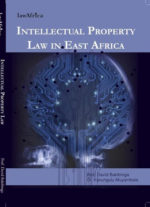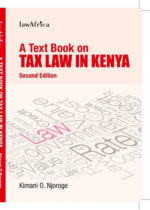The main aim of this book is to provide the reader with knowledge and understanding of some of the key concepts, doctrines and principles which make up that corpus of law known as constitutional law. Another aim is to develop a sound academic basis for the study of subjects based on public law, such as political science and international relations.
Principles of Constitutional Law -(Law africa)
KSh 2,700.00
The main aim of this book is to provide the reader with knowledge and understanding of some of the key concepts, doctrines and principles which make up that corpus of law known as constitutional law. Another aim is to develop a sound academic basis for the study of subjects based on public law, such as political science and international relations.
2 in stock
Related products
-
Introduction to Tax Law Revised Edition
KSh 1,600.00The rules of trade can be sophisticated and misunderstood by business people. In this book the author concisely explains the history of tax, how VAT is calculated with the aid of examples, the functions and the role of Kenya Revenue Authority, different trade treaties agreements, terms and documentation.
-
Litigation-The Art of Strategy and Practice
KSh 2,614.00Litigation – The Art of Strategy and Practice is a practical guide for lawyers and law students, offering insights on case strategy, courtroom skills, and effective advocacy.
The book is not meant to be the final solution to all practical legal problems but rather seeks to provide a quick reference to the common topical issues the litigator faces in court.
-
International Human Rights and their Enforcement in Africa-MORRIS MBONDENYI
KSh 2,400.00The main objective and purpose of this book therefore is to underscore the challenges besetting the effective enforcement of international human rights law in Africa and the prospects and promises of an effective regional human rights system. The book, a revised and updated version of my earlier book entitled The African System on Human and Peoples’ Rights: Its Promises, Prospects and Pitfalls, captures succinctly the recent developments of the system, since the publication of its predecessor. This is done with the understanding that the African human rights system is gradually progressing, despite the fact that it is not only the least developed but also the least effective as compared with its American and European counterparts.
-
Family Law in Kenya: Marriage, Divorce and Children
KSh 2,600.00Family Law in Kenya in so far as it relates to Marriage, Divorce and Children – the focus of this book has been in an unsatisfactory state and calling for reform for a number of decades. Attempts at legislative reform often floundered as successive male-dominated Parliaments rejected them. They finally became a reality when a new constitutional order was promulgated under the Constitution of Kenya, 2010. The new era made possible the enactment of a new statutory framework for marriage, with its antecedents and consequences, as well as matrimonial property with its ownership and distribution.
-
Intellectual Property Law in East Africa
KSh 3,217.00The past half century in Uganda has witnessed both concern and interest in copyright and neighbouring rights. This is evident in the laws and treaties initiated by both the Uganda Government and the international community, aimed at enabling copyright holders to realize the benefi ts of their intellectual works.
-
Cases and Materials on Insurance Law
KSh 34,760.00This Ninth Edition contains extensive updates, with new cases relevant for students anxious to acquire practical knowledge that can be quickly put to use when they enter the profession.
-
THE NEW CONSTITUTIONAL LAW OF KENYA: PRINCIPLES, GOVERNMENT AND HUMAN RIGHTS
KSh 2,400.00On 27 August 2010, a new Constitution for Kenya was promulgated. The Constitution seeks to re-orient the country by establishing a robust dispensation for good democratic governance amenable to the exercise of human rights. This book is tailored to unveil to the reader the fundamental normative and institutional frameworks of Kenya’s new Constitution. Not only does it define key concepts in constitutional law, generally, it also details how government in Kenya has been restructured and re-organised to give effect to the traditional principles that form the basis of constitutional law.
The golden thread that cuts across the various chapters of the book is the emphasis that good constitutions anchor certain tenets that have garnered recognition as hallmarks of democratic dispensation.These hallmarks include the concept of separation of powers; the doctrine of the rule of law; constitutionalism and human rights. These attributes have largely been secured by the 2010 Constitution. Thus, this book is expected to contribute to this new promise by making knowledge on the Constitution accessible through breaking down and contextualising its provisions. It is certain to be useful to law and government students, lawyers, researchers and other persons who seek to understand the new constitutional order. Morris Kiwinda Mbondenyi, LL.D., LL.M. (UNISA), LL.B. (Moi), Senior Lecturer and Head of Department, African Nazarene University. J Osogo Ambani, LL.D. (Cand), LL.M. (UP), LL.B. (UoN), Lecturer, MoiUniversity School of Law. -
A Text Book on Tax Law in Kenya
KSh 2,980.00A Text Book on Tax Law in Kenya is a treatise on Kenyan tax law. It is a reference book for the training of advocates, accountants, tax agents, consultants, business owners, public among other professionals interacting with tax matters. It is an indispensable handbook for any professional pursuing a career in tax including the decision makers, Judges, Magistrates, and Tax Tribunals. It is an extensive summary of the tax law in Kenya and the tax jurisprudence emanating from Kenyan Courts and Tax Appeal Tribunal.









Be the first to review “Principles of Constitutional Law -(Law africa)”